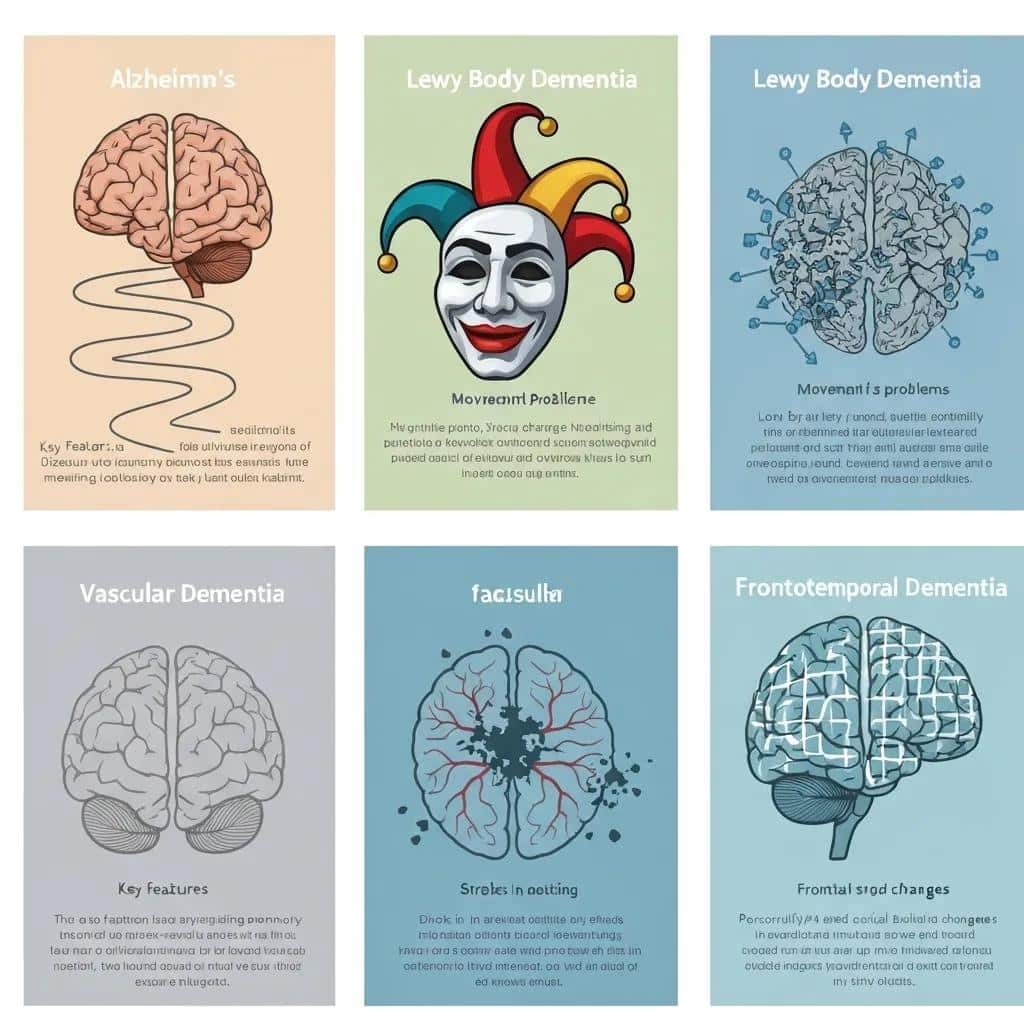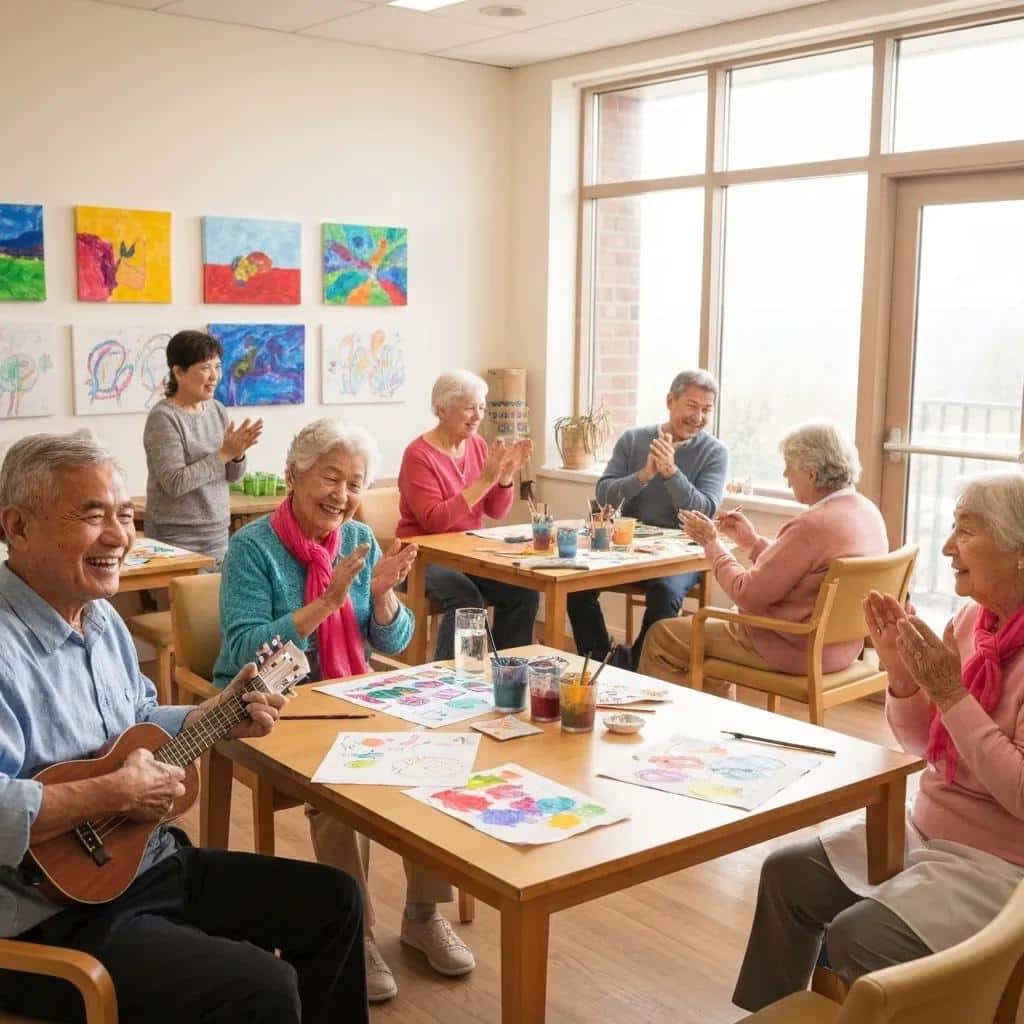Navigate memory care Delray FL with our guide. Discover costs, quality, specialized programs & ensure safe, compassionate support.

Top Cognitive Support Programs at Local Memory Care Homes
Top Cognitive Support Programs at Local Memory Care Homes

Memory Lane Home’s Top Dementia Cognitive Support Programs for Seniors
Dementia erodes memory, language, and reasoning skills through progressive neural damage, creating daily challenges for seniors and families. Memory Lane Home in Ypsilanti and Ann Arbor addresses these challenges by offering personalized cognitive support programs in a home-like setting with a high caregiver-to-resident ratio. This article explores what dementia entails and why specialized interventions—ranging from cognitive stimulation therapy to innovative virtual-reality tools—are vital. You’ll discover how Memory Lane Home crafts individualized plans, the specific therapies it provides, environmental design for cognitive well-being, guidance on choosing the right facility, common program concerns, and why families trust this community for dementia support.
What Is Dementia and How Does It Affect Cognitive Function?
Dementia is a broad term used to describe a range of cognitive impairments that significantly affect an individual’s ability to think, remember, and communicate. It is not a specific disease but rather an umbrella term encapsulating various disorders, including Alzheimer’s disease, vascular dementia, and Lewy body dementia, among others. These conditions are characterized by the progressive degeneration of brain functions, leading to challenges in memory, reasoning, and social abilities. The onset of dementia can vary dramatically among individuals, with symptoms often beginning subtly and gradually progressing over time. Common early signs include forgetfulness, difficulty in managing daily tasks, and confusion about time or place, which can be distressing not only for the person experiencing these changes but also for their loved ones.
Cognitive function refers to various mental processes that include thinking, learning, memory, and problem-solving. As dementia advances, these cognitive functions become increasingly compromised. Individuals may struggle with recognizing familiar faces, recalling recent conversations, or even navigating familiar environments. This decline in cognitive function can lead to behavioral changes, such as increased anxiety, mood swings, and social withdrawal. Over time, as the condition worsens, individuals may lose the ability to communicate effectively and require assistance with basic life skills. Understanding dementia and its impact on cognitive function is essential for fostering compassion and support for those affected, enabling caregivers and communities to create environments that promote dignity and comfort throughout the progression of the disorder.
Dementia is a medical condition defined by a decline in mental abilities severe enough to interfere with daily life. As neurons lose synaptic connections and neurotransmitter balance shifts, memory, language, attention, and problem-solving deteriorate. For families seeking “memory care facilities near me,” understanding dementia’s impact lays the foundation for selecting targeted cognitive support. Progression through dementia stages influences care needs, leading into the specific types of dementia that shape personalized interventions.
What Are the Common Types of Dementia Impacting Seniors?

Memory-related disorders encompass several dementia forms, each with distinct characteristics and cognitive challenges:
How Does Cognitive Decline Progress Through Dementia Stages?
- Mild stage features occasional memory lapses and word-finding difficulties.
- Moderate stage brings persistent disorientation and difficulty with complex tasks.
- Severe stage involves loss of verbal communication and complete dependence for daily living.
Recognizing these phases ensures timely introduction of cognitive therapies that support quality of life and prepare families for evolving care requirements.
Why Is Specialized Cognitive Support Essential in Memory Care?
Specialized cognitive support programs improve or stabilize cognitive function by engaging multiple neural networks through structured activities. They reduce anxiety, enhance mood, and delay behavioral symptoms by leveraging evidence-based techniques. Integrating therapies at the right stage maximizes benefits and creates a sense of purpose for residents, setting the stage for Memory Lane Home’s personalized approach next.
How Does Memory Lane Home Personalize Dementia Care Plans?
Memory Lane Home is dedicated to providing exceptional and personalized care for individuals living with dementia. Recognizing that each person has a unique set of experiences, preferences, and needs, the organization employs a comprehensive approach to tailor care plans specifically for each resident. This begins with an in-depth assessment conducted by trained professionals, who gather information not only about medical histories, but also about personal interests, familial connections, and past hobbies. This holistic evaluation ensures that care plans reflect the individual’s life story, promoting a sense of identity and continuity despite the challenges posed by dementia.
Furthermore, Memory Lane Home emphasizes the importance of ongoing communication and collaboration with family members. By involving loved ones in the care process, the facility gains deeper insights into the social and emotional aspects that are vital for effective care. Additionally, care plans are regularly reviewed and updated to adapt to any changes in the resident’s condition or preferences. This proactive and dynamic approach not only enhances the quality of life for residents but also fosters a nurturing environment where they can thrive, feel secure, and continue to express their individuality. Ultimately, Memory Lane Home’s personalized dementia care plans stand as a testament to their commitment to honoring the dignity and unique life experiences of each resident.
Memory Lane Home designs each dementia care plan through an in-depth assessment of medical history, cognitive abilities, life preferences, and social interests. By aligning therapeutic activities with individual strengths, residents experience greater engagement and measurable improvements in mood and function, reinforcing the value of a high caregiver-to-resident ratio.
What Is the Role of a High Caregiver-to-Resident Ratio in Personalized Support?
A high caregiver-to-resident ratio enables continuous observation and rapid adjustment of activities. Caregivers develop deep familiarity with each resident’s communication style, triggering personalized prompts that sustain engagement and reduce frustration. This intensive attention supports evolving care needs and prepares families for collaborative planning.
How Are Cognitive Care Plans Created and Adapted Over Time?
- Initial Assessment – Evaluate memory, language, and functional abilities through standardized tools.
- Customized Activity Selection – Match therapies—such as music, art, or reminiscence—to resident interests.
- Ongoing Review – Monitor engagement metrics and adjust frequency, complexity, and type of activities monthly.
How Do Families Participate in Personalized Dementia Care Planning?
Family members contribute life stories, favorite music, and personal hobbies during care conferences. Their insights shape activity themes and social goals, fostering continuity of identity. Open communication channels, including scheduled check-ins and digital updates, empower families to reinforce cognitive goals at home and strengthen the care partnership.
What Specific Cognitive Support Programs Are Offered at Local Memory Care Homes?
Local memory care homes often implement a variety of specialized cognitive support programs designed to enhance the quality of life for residents with memory impairments such as Alzheimer’s or other forms of dementia. These programs typically aim to stimulate mental function, promote social engagement, and provide therapeutic experiences that cater to the individual needs of each resident. One common approach involves cognitive training exercises that include games, puzzles, and memory recall activities tailored to challenge residents in a supportive environment. Such activities not only help maintain cognitive abilities but also encourage a sense of achievement and boost self-esteem among participants.
In addition to structured cognitive exercises, many memory care homes provide sensory stimulation and reminiscence therapy programs. These initiatives prioritize engaging residents through familiar music, art, and storytelling, creating an emotional connection that fosters positive memories and encourages social interaction. Staff members are often trained in understanding the needs of individuals with cognitive decline, allowing them to facilitate these programs effectively and adapt them as needed. Furthermore, outdoor activities and physical fitness programs are integrated into daily schedules, recognizing the importance of holistic care in promoting cognitive and physical health. Overall, the cognitive support programs offered at local memory care homes aim to create enriching experiences that not only support mental function but also enhance the overall well-being of residents.
Local memory care programs encompass a spectrum of therapeutic modalities designed to stimulate neural pathways, foster social interaction, and preserve personal identity. By combining evidence-based practices with innovative technologies, residents benefit from a dynamic and engaging environment that supports memory, language, and mood.
Each therapy complements the others, creating a comprehensive program suite.
How Does Cognitive Stimulation Therapy (CST) Improve Memory and Language Skills?
Cognitive Stimulation Therapy (CST) engages residents in themed group activities—such as word games, baking tasks, and discussion circles—to promote neuroplasticity and enhance verbal fluency. Clinical studies show CST participants experience significant improvements in memory recall and conversational abilities within 12 weeks, reinforcing social bonds and boosting self-esteem.
Cognitive Stimulation Therapy (CST) has been shown to improve cognitive function and quality of life for people with dementia through group activities. These activities stimulate memory, language, and executive functions, leading to measurable improvements in cognitive abilities and social interaction.
Spector, A., Thorgrimsen, L., Woods, B., et al., The Lancet (2003)
This research supports the article’s claims about the benefits of Cognitive Stimulation Therapy (CST) in improving memory and language skills in individuals with dementia.
What Are the Benefits of Music and Art Therapy for Seniors with Dementia?

Music therapy uses familiar melodies to evoke emotions and trigger autobiographical memories, while art therapy provides a nonverbal outlet for self-expression. Together, they:
- Improve mood by releasing dopamine through musical engagement.
- Reduce agitation by shifting focus to creative tasks.
- Strengthen hand-eye coordination and fine motor control through brushwork and instrument handling.
Music therapy can significantly reduce agitation and improve mood in individuals with dementia. Studies show that familiar music can evoke positive emotions and memories, leading to a decrease in behavioral symptoms and an increase in social engagement.
Sung, H. C., Journal of Music Therapy (2010)
This citation supports the article’s discussion of music therapy’s benefits in improving mood and reducing agitation in dementia patients.
How Does Reminiscence Therapy Foster Identity and Connection?
Reminiscence therapy revisits personal photographs, cherished belongings, and meaningful life events to reinforce a resident’s sense of self. By prompting storytelling and shared memories in group settings, this approach:
- Validates personal histories and achievements.
- Encourages social bonding through shared experiences.
- Alleviates loneliness by creating communal narratives.
Reinforcing identity prepares residents for gentle physical activities that support cognitive health.
Why Is Physical Activity Important for Brain Health in Memory Care?
Regular physical movement promotes cerebral blood flow, enhances neurotrophic factors, and supports executive function. Gentle exercises—such as walking clubs, chair yoga, and gardening—help residents:
- Maintain mobility and balance.
- Reduce anxiety through endorphin release.
- Boost cognitive alertness via increased oxygenation.
Regular physical activity is associated with improved cognitive function and reduced risk of cognitive decline in older adults. Exercise promotes cerebral blood flow and enhances neurotrophic factors, which are essential for brain health.
Barnes, D. E., & Yaffe, K., Archives of Internal Medicine (2011)
This research supports the article’s emphasis on the importance of physical activity for brain health in memory care.
Physical health improvements often parallel gains in memory retention, tying into modern technological supports.
How Are Innovative Technologies Like VR Used in Cognitive Support?
Virtual-reality experiences transport residents to meaningful environments—familiar hometowns, favorite travel destinations, or immersive nature scenes—triggering rich multisensory engagement. VR programs have been shown to:
- Stimulate memory recall through visual and auditory cues.
- Reduce stress by offering calming simulations.
- Introduce novel cognitive challenges in a safe, controlled context.
These immersive tools complement traditional therapies, enhancing overall program effectiveness.
How Does the Memory Care Environment Support Cognitive Well-being?
In a memory care environment, the design and atmosphere are deliberately crafted to enhance the cognitive well-being of residents with memory-related challenges. Such environments typically include features that promote safety, familiarity, and stimulation. For instance, these spaces are often structured to minimize confusion, using clear signage and color-coded areas that help residents navigate their surroundings comfortably. Familiar objects, pictures, and family photos can evoke memories and provide a sense of belonging, which is essential for emotional well-being. By maintaining a safe and engaging atmosphere, memory care facilities encourage residents to remain active and involved, which can help slow cognitive decline.
Moreover, staff in memory care settings are specially trained to engage with residents in a manner that supports cognitive health. They utilize tailored activities that stimulate various cognitive functions, such as memory games, music therapy, and arts and crafts, all designed to accommodate different levels of cognitive ability. These activities not only foster social engagement among residents but also provide meaningful interactions that can spark joy and enhance mental agility. By focusing on the individual needs and preferences of each resident, memory care environments create a holistic framework for cognitive support, thus significantly contributing to the overall quality of life for those living with memory impairments.
A well-designed memory care environment reduces stress and supports cognitive function by combining safety, familiarity, and sensory stimulation. Memory Lane Home’s six-bedroom ranch houses integrate household comforts with purposeful features that guide daily routines and foster independence.
What Features Create a Safe, Familiar, and Stimulating Home-Like Setting?
Creating a safe, familiar, and stimulating home-like setting involves a thoughtful combination of features that cater to emotional, physical, and sensory well-being. At the core of this environment is safety, which is paramount for residents, particularly in settings like assisted living facilities or rehabilitation centers. Key safety features include the installation of non-slip flooring, wide hallways to accommodate mobility aids, and adequate lighting to prevent accidents. Moreover, the incorporation of accessible design elements, such as grab bars in bathrooms and emergency call systems, ensures that residents feel secure in their surroundings. These physical aspects contribute to a sense of stability and reduce anxiety, making individuals feel more at home. Every living space includes:
- Clear Wayfinding with color-coded hallways and prominent signage.
- Secure Outdoor Paths for safe walking and gardening activities.
- Sensory Corners featuring tactile walls, scent stations, and memory tables.
A nurturing environment extends to dining, where nutrition plays a pivotal role.
How Does Nutrition Contribute to Brain Health in Memory Care Residents?
Nutrition plays a pivotal role in supporting brain health, especially for memory care residents who may be dealing with cognitive decline due to conditions such as Alzheimer’s or other forms of dementia. The brain requires a steady supply of nutrients to maintain optimal function, and deficiencies in key vitamins and minerals can exacerbate cognitive impairment. A well-balanced diet rich in antioxidants, healthy fats, vitamins, and minerals can help combat oxidative stress, reduce inflammation, and promote overall brain resilience. For instance, omega-3 fatty acids found in fish and flaxseeds have been linked to improved cognitive function, while antioxidants present in fruits and vegetables can help protect brain cells from damage. Tailored meal plans emphasize omega-3 fatty acids, antioxidants, and B-vitamins to support neuronal function. Residents enjoy:
- Fresh fish, nuts, and seeds for anti-inflammatory benefits.
- Colorful fruits and vegetables rich in polyphenols to combat oxidative stress.
- Hydration stations with flavored water and herbal teas to prevent cognitive fog.
Nutritional support reinforces the impact of cognitive and physical therapies by maintaining overall brain health.
How Can Families Choose the Right Memory Care Facility with Cognitive Support?
Choosing the right memory care facility for a loved one can be a daunting task for families, especially when considering the specialized cognitive support needed for individuals with dementia or other memory-related conditions. Families should begin by assessing the specific needs of their loved one. This includes evaluating their level of cognitive functioning, physical health, and emotional well-being. Understanding these needs allows families to narrow down their options to facilities that provide tailored care, which may include cognitive therapies, personalized activities, and medication management. Additionally, families should look for staff qualifications and training in dementia care, as well as the facility’s overall approach to supporting residents with cognitive challenges.
Visiting potential memory care facilities is essential for families to gain firsthand insights into the environments and care practices. During these visits, families should observe interactions between staff and residents, as well as evaluate the cleanliness and safety of the facilities. Engaging in conversations with current residents and their families can provide valuable perspectives on the quality of care offered. Furthermore, families should inquire about the facility’s programming, including social activities, cognitive engagement opportunities, and support for family involvement, which can be crucial in fostering a sense of community and connection for residents. Ultimately, finding a memory care facility that aligns with the family’s values and meets the emotional and practical needs of their loved one is key to ensuring a supportive and nurturing environment.
Selecting a memory care community requires assessing program quality, environment, staffing, and financial considerations. By asking targeted questions and comparing options, families can find a facility that aligns with their loved one’s needs and budget.
What Questions Should Families Ask When Evaluating Memory Care Homes?
When families begin the process of evaluating memory care homes for their loved ones, it is essential to ask specific questions that can reveal the quality of care and the environment offered at these facilities. A critical area to explore is the staff qualifications and training programs in place. Families should inquire about the ratio of staff to residents, the experience levels of the caregivers, and any specialized training they receive in handling the unique challenges posed by dementia and other cognitive impairments. Understanding the facility’s approach to care, including how they manage daily activities and engage residents in meaningful ways, can provide families with peace of mind regarding their loved one’s well-being. When touring facilities, families should inquire about:
- Staff Credentials – Training in dementia-specific interventions?
- Caregiver Ratio – Average number of residents per caregiver?
- Therapy Variety – Range of cognitive, physical, and creative programs?
- Safety Measures – Fall prevention systems and secure exits?
- Family Involvement – Frequency of care plan updates and family conferences?
These questions clarify program strengths and inform cost discussions.
What Are the Typical Costs and Financial Options for Memory Care?
When considering memory care options for a loved one, understanding the associated costs and financial avenues is crucial. Memory care facilities can range significantly in price, typically costing between $4,000 and $8,000 per month, depending on factors such as location, level of care required, and amenities offered. For instance, facilities in urban areas might command higher prices compared to those in rural settings. Additionally, the cost can increase based on the severity of cognitive impairment and the necessity for personalized care programs, which may include specialized therapies or activities tailored to memory-related conditions like Alzheimer’s disease. Memory care pricing varies by location and program intensity, typically ranging from mid-four to five-figure monthly rates. Financing may include veterans’ benefits, long-term care insurance, and state assistance programs. Transparent cost breakdowns help families budget for care without unexpected expenses.
What Local Resources Are Available in Ypsilanti and Ann Arbor for Dementia Care?
In Ypsilanti and Ann Arbor, a variety of local resources are available to support individuals and families affected by dementia. The region boasts several dedicated organizations and facilities that cater to the unique needs of those navigating the challenges of dementia care. One prominent resource is the Alzheimer’s Association Michigan Chapter, which offers educational programs, support groups, and a 24/7 helpline. These services empower caregivers with knowledge and emotional support, creating a network of understanding among those facing similar struggles. Additionally, both cities have specialized memory care facilities that provide tailored assistance, ensuring a safe and nurturing environment for residents. Families benefit from community partners offering support beyond residential memory care:
- Alzheimer’s Association Michigan Chapter – Educational workshops and helplines.
- Area Agency on Aging 1-B – Caregiver support groups and respite services.
- Local Senior Centers – Day programs with intergenerational activities.
Leveraging these resources enhances comprehensive dementia support.
What Are Common Questions About Cognitive Support Programs at Memory Care Homes?
Cognitive support programs at memory care homes play a crucial role in enhancing the quality of life for residents dealing with memory-related conditions such as Alzheimer’s disease and other forms of dementia. As families seek suitable environments for their loved ones, they often have a series of common questions regarding the nature and effectiveness of these programs. One prevalent inquiry involves the types of cognitive activities offered. Families want to know what specific interventions are employed to stimulate cognitive function, enhance memory retention, and foster social engagement among residents. Activities may include puzzles, memory games, music therapy, and storytelling sessions, all designed to tailor the stimulation to the individual’s abilities and interests.
Another frequent question revolves around the qualifications of staff leading these programs. Families are understandably concerned about the expertise and training of caregivers and professionals who facilitate cognitive support activities. They often ask about the credentials of staff members, the staff-to-resident ratio during these activities, and ongoing training in specialized approaches for memory care. Additionally, potential residents’ families may inquire about how programs are personalized to meet the unique needs of each individual, ensuring that cognitive support is both relevant and beneficial. By addressing these common questions, memory care homes can provide reassurance to families, demonstrating their commitment to enhancing the cognitive abilities and overall well-being of residents through comprehensive support programs.
Families often wonder which activities yield the greatest benefits, how personalized plans improve daily life, and how support integrates into everyday routines. Clear answers to these concerns reassure decision-makers that residents receive holistic engagement and compassionate supervision.
Addressing these topics underscores the role of tailored programs in daily care.
What Are the Best Cognitive Activities for Dementia Patients?
When it comes to supporting individuals with dementia, engaging in cognitive activities is crucial for maintaining mental acuity and fostering a sense of connection with the world. The best cognitive activities for dementia patients are those that stimulate the brain while also accommodating varying levels of cognitive decline. Activities such as puzzles, memory games, and simple card games can be beneficial, as they encourage problem-solving and memory recall. Additionally, interactive games that involve social elements—like bingo or group trivia—can enhance social interaction, which can be essential for the emotional well-being of dementia patients. The most effective activities combine mental challenge with personal relevance. Top choices include:
- Themed Group Discussions that spark recall of shared events.
- Interactive Music Sessions using playlists from a resident’s youth.
- Art Projects tailored to individual skill levels.
- Memory-based Games such as matching familiar faces.
These pursuits boost attention, social interaction, and emotional connection.
How Do Personalized Dementia Care Plans Benefit Seniors?
Personalized dementia care plans play a crucial role in enhancing the quality of life for seniors living with cognitive decline. These tailored plans take into account the unique needs, preferences, and abilities of each individual, ensuring that care is not only effective but also respectful of the senior’s personal history and values. By focusing on the individual rather than adopting a one-size-fits-all approach, caregivers can address specific challenges associated with dementia, such as memory loss, communication difficulties, and changes in behavior. This personalized attention allows caregivers to craft strategies that resonate with the senior’s past experiences, aiding in better engagement and comfort throughout their day. Individualized plans align therapies with resident histories and abilities, creating:
- Greater Engagement because activities reflect personal interests.
- Reduced Agitation through predictable routines and familiar stimuli.
- Improved Cognitive Outcomes by focusing on measurable goals.
Tailored approaches foster independence and enhance overall well-being.
What Is Cognitive Stimulation Therapy and How Is It Used?
Cognitive Stimulation Therapy (CST) is an evidence-based therapeutic approach designed to enhance cognitive functioning and overall well-being among individuals with mild to moderate dementia. This therapy engages participants in a series of structured activities and discussions that focus on various cognitive tasks, such as memory recollection, problem-solving, and word association. Throughout the process, the aim is to stimulate brain activity and promote social interaction, which can be particularly beneficial for dementia patients who often experience isolation and cognitive decline. Research has shown that CST can help improve participants’ cognitive abilities, quality of life, and mood, making it a valuable tool in the realm of dementia care. Cognitive Stimulation Therapy (CST) is an evidence-based, non-drug intervention involving themed group activities to activate multiple cognitive domains. It’s implemented through weekly sessions that challenge memory, language, and executive function, leading to documented gains in recall and communication skills.
How Do Memory Care Facilities Support Cognitive Health Daily?
Memory care facilities are specialized living environments designed to support individuals with cognitive impairments such as Alzheimer’s and other forms of dementia. Each day, these facilities employ a range of strategies and activities to promote cognitive health and enhance the quality of life for their residents. Staff members are trained to provide personalized care that addresses the unique needs of each individual, focusing on maintaining cognitive function through various engaging activities. These activities may include memory exercises, group discussions, and personalized reminiscence therapy, which stimulates the mind while fostering social interaction among residents. Day-to-day support integrates structured routines, personalized prompts, and adaptive environments. Caregivers guide residents through morning cognitive warm-ups, midday creative therapy, and evening reminiscence circles, reinforcing consistency and maximizing neural engagement throughout every day.
Why Is Memory Lane Home a Trusted Partner for Cognitive Support in Ypsilanti and Ann Arbor?
Memory Lane Home has established itself as a trusted partner for cognitive support in Ypsilanti and Ann Arbor, offering specialized services tailored to meet the unique needs of individuals facing cognitive challenges. The facility prides itself on its compassionate approach, combining a robust understanding of neurodegenerative conditions with a commitment to enhancing the quality of life for both clients and their families. With a team of experienced professionals, including caregivers trained in memory care techniques, Memory Lane Home fosters an environment that prioritizes safety, comfort, and engagement. This dedication ensures that residents feel understood and valued, which is crucial in addressing the emotional and psychological aspects of cognitive decline.
Additionally, Memory Lane Home utilizes evidence-based practices to create individualized care plans that respect the preferences and histories of each resident. The facility’s programming includes a variety of stimulating activities designed to promote cognitive function and encourage social interaction, thereby helping to maintain mental acuity and emotional well-being. By creating meaningful experiences that resonate with residents, Memory Lane Home not only aids in cognitive support but also builds a sense of community. The positive reputation that Memory Lane Home has garnered in the Ypsilanti and Ann Arbor areas reflects its unwavering commitment to excellence in care, making it the go-to resource for families seeking reliable cognitive support for their loved ones.
Memory Lane Home’s reputation stems from its compassionate small-home model, high caregiver-to-resident ratio, and deep expertise in dementia care. Families reliably observe improved mood, increased participation, and preserved dignity among residents. This local focus creates a network of community trust that underpins every therapeutic success.
How Does Memory Lane Home’s High Caregiver Ratio Enhance Resident Care?
At Memory Lane Home, the commitment to providing exceptional resident care is underscored by a meticulously designed caregiver-to-resident ratio that surpasses industry standards. This strategic approach ensures that each resident receives personalized attention and care tailored to their individual needs. By maintaining a high caregiver ratio, Memory Lane Home is able to foster deeper relationships between caregivers and residents, allowing for more meaningful interactions and a heightened sense of companionship. This intimate environment not only promotes emotional well-being but also enhances the overall quality of life for residents, as they feel valued and understood in their daily experiences. With one caregiver for every three to four residents, Memory Lane Home ensures attentive supervision, swift adaptation of activities, and meaningful personal relationships. This ratio boosts consistency in engagement and fosters an atmosphere of reassurance and stability.
What Success Stories Demonstrate the Impact of Our Cognitive Programs?
Success stories serve as powerful testimonials that illustrate the profound impact of cognitive programs. These narratives highlight how individuals have transformed their lives through enhanced cognitive skills, such as improved memory, critical thinking, and problem-solving abilities. For instance, participants who have engaged in structured cognitive training often report significant improvements in their academic performance, professional capabilities, and overall mental agility. These transformations are not merely anecdotal; they are supported by evidence showing that cognitive programs can lead to measurable improvements in learning outcomes and better decision-making in everyday life. Numerous residents have rediscovered joy and connection through customized therapies:
- Mrs. A., once nonverbal, now shares daily music memories in group sing-along sessions.
- Mr. B., previously withdrawn, engages in puzzle groups, showing marked improvements in problem-solving confidence.
- Ms. C., who no longer recognized family photos, now leads reminiscence activities that spark collective storytelling.
These outcomes illustrate the transformative power of tailored cognitive support.
How Can Families Schedule a Tour or Consultation?
Families are encouraged to call Memory Lane Home’s Ypsilanti or Ann Arbor location to arrange a personalized tour and complimentary consultation. During the visit, you’ll experience therapy spaces, meet dedicated caregivers, and discuss a customized care plan tailored to your loved one’s history and aspirations. Experience, empathy, and expertise converge at Memory Lane Home, offering families peace of mind and residents meaningful engagement. Every element—from environment design to innovative VR tools— works in harmony to support memory, identity, and quality of life. Memory Lane Home remains committed to pioneering person-centered cognitive care, ensuring seniors with dementia thrive in a supportive, home-like community.
Frequently Asked Questions
What are the signs that a loved one may need memory care?
Recognizing the need for memory care can be challenging. Common signs include frequent memory loss, difficulty performing familiar tasks, confusion about time or place, and changes in mood or behavior. If your loved one struggles with daily activities, exhibits significant personality changes, or has trouble communicating, it may be time to consider a memory care facility. Early intervention can lead to better outcomes, so it’s essential to assess their needs and seek professional guidance if necessary.
How can families support their loved ones in memory care?
Families can play a crucial role in supporting their loved ones in memory care by maintaining regular communication and visits. Engaging in activities together, such as reminiscing about shared memories or participating in therapy sessions, can strengthen bonds. Additionally, providing caregivers with insights about the resident’s preferences and history can enhance personalized care. Encouraging participation in social activities and being involved in care planning meetings also fosters a sense of belonging and continuity for the resident.
What role does technology play in enhancing cognitive support?
Technology significantly enhances cognitive support in memory care through tools like virtual reality (VR) and cognitive training apps. VR can create immersive experiences that stimulate memory recall and reduce anxiety by transporting residents to familiar environments. Additionally, cognitive training apps can provide personalized exercises that adapt to individual needs, promoting engagement and cognitive function. These technological innovations complement traditional therapies, making cognitive support more dynamic and effective in improving residents’ quality of life.
How do memory care facilities ensure safety for residents?
Memory care facilities prioritize safety through various design features and protocols. Secure environments often include locked entrances and exits to prevent wandering, along with clear wayfinding systems to help residents navigate. Staff are trained in safety protocols, including fall prevention and emergency response. Regular safety assessments and maintenance of the facility ensure that all areas are free from hazards. These measures create a secure atmosphere where residents can explore and engage safely while receiving the care they need.
What should families expect during the transition to memory care?
The transition to memory care can be emotional for both residents and families. Initially, residents may experience feelings of confusion or anxiety about the change. Families should expect to engage in open discussions with caregivers about the resident’s needs and preferences. It’s important to visit frequently during the adjustment period to provide reassurance. Over time, as residents become familiar with their new environment and routines, they often adapt and may even thrive in the supportive community setting.
Are there specific dietary considerations for seniors in memory care?
Yes, dietary considerations are crucial for seniors in memory care. Nutrition plays a significant role in cognitive health, so meal plans often emphasize foods rich in omega-3 fatty acids, antioxidants, and vitamins that support brain function. Caregivers should ensure that meals are balanced, appealing, and cater to individual dietary restrictions or preferences. Hydration is also essential, so providing easy access to fluids throughout the day helps prevent cognitive fog and supports overall well-being.


